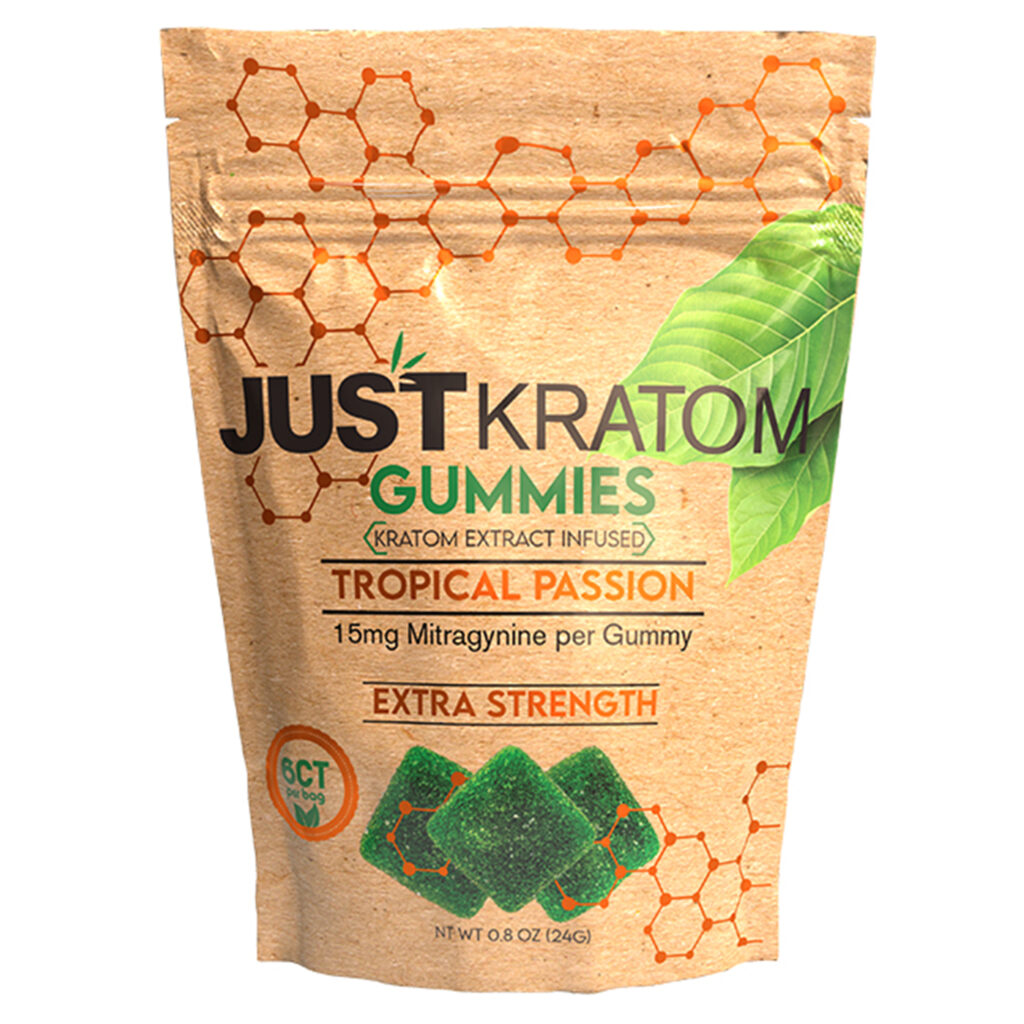Kratom Gummies For Focus And Concentration: Do They Work?
May 25, 2025
Mechanism of Action
Understanding how kratom affects the brain is crucial to evaluating its potential benefits, especially for cognitive enhancement like focus and concentration. Kratom’s mechanism of action involves interacting with opioid receptors in the body, leading to a variety of effects that may impact mental performance.
Kratom’s Effects on the Brain
Kratom’s primary mode of action centers around its interaction with opioid receptors in the brain. It contains alkaloids, including mitragynine and 7-hydroxymitragynine, which bind to mu-, kappa-, and delta-opioid receptors. Activation of these receptors produces a range of effects, including pain relief, mood alteration, sedation, and increased energy.
The specific effects on focus and concentration are complex and depend on the dosage and individual user. At lower doses, kratom may enhance alertness and cognitive function by stimulating opioid receptors associated with arousal. However, higher doses can lead to sedation and impair mental clarity.
Stimulatory and Relaxing Properties
Kratom’s mechanism of action involves interacting with opioid receptors in the body, leading to both stimulatory and relaxing properties. The specific effects depend on the dosage and individual user.
At lower doses, kratom may stimulate these receptors, potentially enhancing alertness and cognitive function. This could explain why some people report improved focus and concentration when using kratom at low doses. However, higher doses tend to activate different receptors, leading to sedation and decreased mental clarity.
Research and Evidence
To assess the effectiveness of kratom gummies for improving focus and concentration, it’s essential to delve into the scientific evidence surrounding kratom’s mechanisms of action.
Studies on Kratom and Cognition
While anecdotal reports suggest that kratom can enhance focus and concentration, robust scientific evidence supporting this claim is limited. Research on kratom’s cognitive effects is still in its early stages.
Most studies examining kratom’s impact on cognition have been small and methodological limitations exist. Further research, particularly large-scale, well-controlled clinical trials, is needed to definitively determine the effectiveness of kratom gummies for improving focus and concentration.
Moreover, individual responses to kratom can vary significantly depending on factors like dosage, strain, metabolism, and existing health conditions. What works for one person may not work for another.
Limitations of Current Research
Current research on kratom’s effects on focus and concentration is limited. While some studies suggest potential benefits, they often suffer from methodological limitations, small sample sizes, or lack of control groups.

The complexity of kratom’s interaction with the opioid system makes it difficult to isolate its cognitive effects. Additionally, individual responses to kratom can vary greatly, making it challenging to draw definitive conclusions about its efficacy for improving focus and concentration.
More comprehensive research, including large-scale clinical trials with rigorous controls, is necessary to determine the true potential of kratom gummies for enhancing cognitive function.
Potential Benefits for Focus and Concentration
The potential benefits of kratom for focus and concentration are a subject of growing interest. Kratom, an herbal supplement derived from the Mitragyna speciosa tree, interacts with opioid receptors in the brain, potentially influencing alertness, cognitive function, and mood.
Improved Alertness and Mental Clarity
At lower doses, kratom may stimulate opioid receptors associated with arousal, potentially leading to increased alertness and improved focus. Some users report enhanced cognitive function and concentration after consuming kratom at low doses.
However, higher doses of kratom tend to activate different opioid receptors, leading to sedation and decreased mental clarity. This suggests that the impact of kratom on focus and concentration is dose-dependent, with optimal effects observed at lower dosages.
Increased Productivity and Focus
The potential benefits of kratom for focus and concentration are a subject of growing interest. Kratom, an herbal supplement derived from the Mitragyna speciosa tree, interacts with opioid receptors in the brain, potentially influencing alertness, cognitive function, and mood.
- At lower doses, kratom may stimulate opioid receptors associated with arousal, potentially leading to increased alertness and improved focus.
- Some users report enhanced cognitive function and concentration after consuming kratom at low doses.
- However, higher doses of kratom tend to activate different opioid receptors, leading to sedation and decreased mental clarity.
This suggests that the impact of kratom on focus and concentration is dose-dependent, with optimal effects observed at lower dosages.
Reduced Anxiety and Stress
Kratom’s potential benefits for focus and concentration stem from its interaction with opioid receptors in the brain. At lower doses, kratom may stimulate these receptors, leading to increased alertness and improved cognitive function. This could explain why some users report enhanced focus and concentration when using kratom at low doses.
However, it’s important to note that higher doses tend to activate different opioid receptors, resulting in sedation and decreased mental clarity. Therefore, the impact of kratom on focus and concentration is dose-dependent, with optimal effects observed at lower dosages.
Furthermore, kratom can also have anxiolytic effects by interacting with certain neurotransmitter systems involved in regulating anxiety. By reducing stress and anxiety levels, kratom may indirectly contribute to improved focus and concentration.
Dosage Considerations
Kratom’s potential benefits for focus and concentration are thought to stem from its interaction with opioid receptors in the brain. At lower doses, it is believed to stimulate these receptors, leading to increased alertness and potentially improving cognitive function.
However, it is crucial to understand that higher doses of kratom can have the opposite effect, causing sedation and impairing mental clarity. Therefore, finding the right dosage is essential for experiencing potential benefits without adverse effects.
Dosage considerations for kratom are complex and highly individualistic. Factors such as body weight, metabolism, tolerance, and desired effects all play a role in determining the appropriate dose. It is generally recommended to start with a low dose (1-3 grams) and gradually increase it until the desired effect is achieved.
It’s important to note that kratom can have different effects on different people, and what works for one individual may not work for another. Close attention should be paid to how kratom affects you personally and adjustments made accordingly.
Tolerance and Dependence
Kratom’s potential benefits for focus and concentration are linked to its interaction with opioid receptors in the brain. At lower doses, it is thought to stimulate these receptors, potentially leading to increased alertness and improved cognitive function.
However, higher doses can lead to sedation and impaired mental clarity. Therefore, the impact of kratom on focus and concentration appears to be dose-dependent, with optimal effects observed at lower dosages.
The potential for dependence and tolerance with kratom use exists. As with any substance that interacts with the brain’s reward system, regular use can lead to physical and psychological dependence.
Tolerance can develop over time, meaning higher doses are needed to achieve the same effects.
Individuals who misuse kratom or use it for extended periods may experience withdrawal symptoms when they try to stop, such as irritability, anxiety, muscle aches, and insomnia.
It’s important to note that research on kratom’s long-term effects is limited. More studies are needed to fully understand the risks associated with chronic use, including the potential for dependence and tolerance.
Interactions with Medications

Kratom’s potential benefits for focus and concentration are linked to its interaction with opioid receptors in the brain. At lower doses, it is thought to stimulate these receptors, potentially leading to increased alertness and improved cognitive function.
However, higher doses can lead to sedation and impaired mental clarity. Therefore, the impact of kratom on focus and concentration appears to be dose-dependent, with optimal effects observed at lower dosages.
Individuals taking certain medications should exercise caution when considering kratom use due to potential interactions. Kratom’s effects on opioid receptors could influence the metabolism or action of some medications.
It is crucial to consult a healthcare professional before using kratom, especially if you are currently taking any medications, as there might be risks involved.
Legal Status and Regulations
Legal status and regulations surrounding kratom vary widely across the globe. In some countries, it is legal and readily available, while in others, it is prohibited or tightly controlled.
Within the United States, kratom’s legal status is a patchwork of state laws. Some states have outright banned kratom, while others allow its sale and consumption.
The Drug Enforcement Administration (DEA) has attempted to classify kratom as a Schedule I drug, citing concerns about its potential for abuse and lack of accepted medical use. However, legal challenges have prevented this classification from taking effect.
The ongoing debate surrounding kratom’s legality reflects the complex considerations involved in regulating substances with both potential benefits and risks.
Varying Laws Across Jurisdictions
Legal status and regulations surrounding kratom vary significantly across jurisdictions.
In some countries, kratom is legal and readily available, while in others, it is prohibited or heavily regulated.
Within the United States, kratom’s legal status is a patchwork of state laws. Some states have banned kratom outright, while others allow its sale and consumption with varying restrictions.
The Drug Enforcement Administration (DEA) has attempted to classify kratom as a Schedule I drug, citing concerns about its potential for abuse and lack of accepted medical use.
However, legal challenges have prevented this classification from taking effect.
This ongoing debate highlights the complex considerations involved in regulating substances with both potential benefits and risks.
Safety Concerns and Consumer Protection
The legal status of kratom varies greatly around the world. Some countries have legalized it, while others have banned or heavily restricted its use. Within the United States, kratom’s legal status is a patchwork, with individual states having their own laws governing its sale and consumption.
Safety concerns regarding kratom stem from its potential for adverse effects, including dependence, withdrawal symptoms, and interactions with medications. Kratom can interact with opioid receptors in the body, leading to a range of effects similar to opioids such as pain relief and sedation. This raises concerns about the potential for abuse and addiction.
Consumer protection is crucial when it comes to kratom products. The lack of strict regulation in many areas means that the quality, purity, and potency of kratom products can vary significantly between manufacturers. Consumers should be cautious about purchasing kratom from unregulated sources and look for products that have been tested by a third-party laboratory.
Top Kratom Gummies for your lifestyle
- Xela Rederm Skin Booster Treatments Near Witley, Surrey - January 25, 2026
- Xela Rederm Skin Booster Treatments Near Horley, Surrey - January 23, 2026
- Will Retinol Help Smokers Lines? - January 21, 2026
